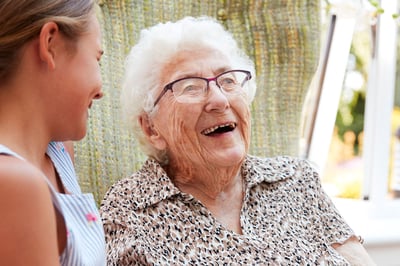 Have you laughed with your older loved one today?
Have you laughed with your older loved one today?
Embracing the lighter side of life, even when we are experiencing struggle, is good for our mental and physical health.
Laughter Is Good Medicine
Laughter is an easy, inexpensive, and efficient healing technique. Research shows that it has profound psychological and physiological benefits.
Laughter is a powerful form of stress relief that works in a number of different ways. It increases the endorphins released by the brain, decreases the stress response, and alleviates tension, according to the Mayo Clinic.
Laughter has long-term effects on our health too. It has been shown to improve mood and increase personal satisfaction levels, boost the immune system, and even relieve pain.
According to an article published in The Independent, “laughter, humor, and happiness play a key role in good health and longevity, and can positively affect diseases and conditions including high blood pressure, flu, heart disease, arthritis, and diabetes.”
Laughter has also been shown to reduce inflammation, which affects many age-related diseases such as arthritis and cancer.
It even burns calories and can help people live longer.
Laughter as a Lifeline
Caregiving isn't always a barrel of laughs, particularly when you're dealing with someone who is in great pain, suffering from memory loss, or prone to being crabby. Looking for moments of levity during particularly overwhelming times can be an invaluable lifeline.
Don’t worry too much about whether your loved one will be offended by your laughter. More often than not, laughing together at a surprising, unexpected, awkward, or amusing moment can help you bond and connect.
Your good mood and positive outlook can be reassuring to seniors. And nothing diffuses a particularly tense or difficult moment quite like laughter.
Clown Therapy and Laughter Yoga
Because of the many ways laughter makes life better, many hospitals and health centers are now offering “humor therapy” to patients. It can include everything from watching movies to reading books.
A global movement called “laughter yoga” combines yoga breathing techniques with group laughing sessions. The laughter starts out forced but soon starts flowing naturally.
Researchers have also found that something called “clown therapy” is as effective as medication in reducing aggression levels and increasing communication in seniors with dementia.
The Lighter Side of Caregiving
Not all seniors have access to formal humor therapies, but caregivers can also infuse laughter into their lives by sharing jokes, stories, outings to comedy clubs, or anything that allows patients and caregivers alike to reap the benefits of a good guffaw.
There are many everyday ways for caregivers to infuse more levity and laughter into the lives of their loved ones—even the cranky ones.
Caregivers also benefit when they can find humor in their own predicaments. Laughing can be a wonderful way to diffuse tension, offset an awkward or challenging interaction, or reverse your perspective.
Researchers from the University of California at Berkeley and the University of Zurich determined that people who could see the humor in their own situations had more genial personalities and positive outlooks.
If you are struggling with caregiving duties, laughter can help lighten the emotional burden.
Laughter Is Connection
For caregivers struggling to communicate with loved ones, meanwhile, laughter can also be a way to connect with those around us.
Smiling and laughing with our older loved ones, nurses, doctors, and other caregivers makes us feel better and better able to cope with the difficulties of our responsibilities.
For caregivers who feel the burden of taking care of elderly relatives, spending time with other caregivers and sharing experiences, even the absurd ones, can help ease the stress.
Whether a senior is living in a facility or aging in place, injecting a little lighthearted humor into day-to-day activities will go a long way toward reducing stress, improving health, and strengthening those important connections that keep us going.

